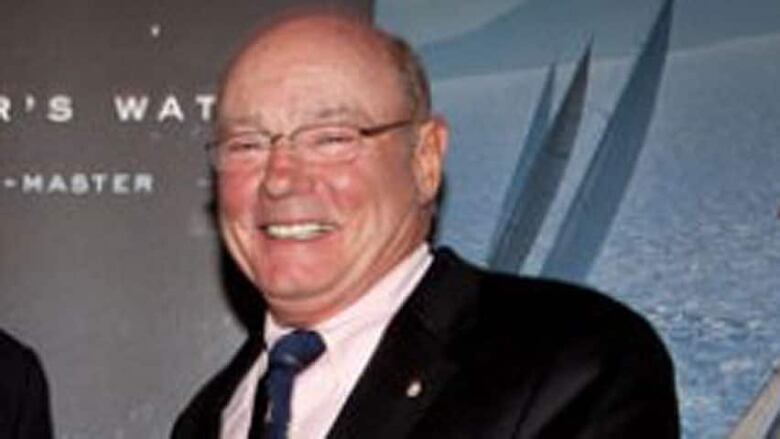Seizure of Dennis Oland's brown jacket 'could have been done better'
Forensics officer testifies about folding blood-stained jacket and placing it in paper exhibit bag

The forensics officer who handled the seizure of Dennis Oland's blood-stained brown sports jacket from his home in 2011 says "it could have been done better."
Saint John Police Force Const. David MacDonald made the statement on Monday during cross-examination by defence lawyer Alan Gold at Oland's second-degree murder trial.
- Live blog: Dennis Oland's second-degree murder trial: Nov. 16
- On mobile: Get live coverage here
MacDonald previously testified that he placed the jacket into a paper bag that measured about 30 centimetres by 30 centimetres.
"It barely fit in there, so I just folded it up as best as I could and put it into it," he had said.
Gold asked MacDonald whether it had occurred to him that folding the jacket up would cause different areas of the jacket to touch and might cause evidence to migrate from one area to another.
MacDonald, who now works in patrol, said it did not occur to him at the time. But he noted it was a "dry exhibit."

Still, MacDonald said if he had to do it again, he would probably put the jacket in a larger bag.
The jacket is a key piece of evidence in the Crown's case against Oland in the death of his father, prominent businessman Richard Oland.
Lead Crown prosecutor P.J. Veniot told the jury during his opening statement that the jacket had four areas of blood on it that matched the victim's DNA profile.
The bludgeoned body of Richard Oland, 69, was discovered lying face down in a pool of blood in his investment firm office on July 7, 2011. He had suffered 45 sharp and blunt force injuries to his head, neck and hands.
Dennis Oland, 47, who was the last known person to see his father alive during a meeting at his Canterbury Street office the night before, has pleaded not guilty to second-degree murder.
The accused told police during a voluntary statement on July 7 that he was wearing a navy blazer when he visited his father, but video surveillance of him earlier that day shows he was wearing a brown jacket.

MacDonald previously revealed the former lead investigator, retired constable Rick Russell, had touched the sleeve of the jacket without wearing any protective gloves.
"You got upset with him?" asked Gold. MacDonald said he's not sure if he voiced it or not, but agreed he was upset because he was trying to protect evidence from any contamination.
Gold asked whether MacDonald had circled the area Russell had touched. He did not, he replied.
Stored for 4 months
The Hugo Boss jacket remained stored in the paper bag for about four months, until MacDonald examined it. A photo of the wrinkled jacket was shown to the jury.
MacDonald said he spent a total of about five hours examining the jacket — four hours on Nov. 9 and another hour on Nov. 17.

MacDonald confirmed there was no way to say how long the stains had been on the jacket.
The jacket spent nearly a year in the hands of the RCMP, the court heard. MacDonald dropped the jacket off in Halifax on Nov. 30 and picked it up on July 30, 2012. It was sent to the RCMP lab again on Oct. 26, 2012, and was picked up on Feb. 14, 2013, he said.
Gold went over the test results of several other items seized from Oland's home, including clothing and shoes, the lint trap from his dryer and garbage bags found in the basement, which came back negative for blood.
Similarly, there was no trace evidence found in Oland's Volkswagen Golf that "in any way advanced any case against" him, or in or on a red reusable Sobeys Compliments grocery bag bag seized from the trunk "that in any way connected Dennis Oland to this homicide," said Gold. MacDonald agreed.
Tests of a sailboat at the yacht club in Millidgeville, a camp log book police believe was at the crime scene, swabs of the crime scene, and hairs and fibre samples taken during the autopsy also failed to produce "fruitful" results, said Gold.
Dry cleaner didn't notice stains
The court also heard Monday from the man who dry cleaned Oland's brown jacket on July 8 — the day after police told Oland he was a suspect in his father's death.
Yang Hwan Nam, who co-owns VIP Dry Cleaners in Rothesay with his wife, testified with the help of a Korean interpreter that it's up to customers to tell them if there are any stains on the items being dropped off, but he normally checks too, in case customers forget.
If he finds any stains, he marks them with red tape and then pre-treats them, he said.
VIP advertises that it offers a gentler service because it uses a mild detergent, so Nam usually checks items after they've been cleaned for any stains as well.
Nam said as far as he can remember, he told police in July 2011 he didn't notice any stains on the 19 items Oland's wife, Lisa, had dropped off, including the brown sports jacket.
He wasn't formally interviewed by police until February 2015 — about 3½ years later, he said.
Nam confirmed VIP's normal turnaround time is two business days, but Oland's receipt shows next day service was requested.
VIP also offers same day service, if requested, he said.
Justice John Walsh told the jury on Monday morning the Crown expects to finish presenting its case next week.
The defence will then present its case.
The trial is currently scheduled to run until Dec. 18.
It resumes on Tuesday at 9:30 a.m. when the Crown will call a witness to testify about Richard Oland's cellphone.
His iPhone 4 was the only item that went missing from the crime scene.